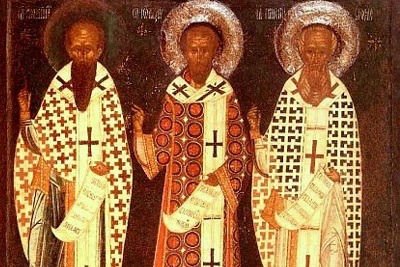
THE THREE HIERARCHS AND ECUMENICAL TEACHERS: BASIL, GREGORY, AND JOHN CHRYSOSTOM
Jerusalem Patriarchate – 14/2/21 – An article by Heba Hrimat
During the reign of Emperor Alexius Comnenus (1081-1118), a debate arose in Constantinople between men of knowledge and faith about the Church Fathers Basil the Great, Gregory the Theologian and John Chrysostom, about who surpasses the other in explaining the mysteries of faith, and rose to angelic rank by his virtues.
Partisans of St. Basil argued that he was the founder of monastic life and the leader of the church in its struggles with heresy, that he was strict and was the patron of Christian morals, in him there was nothing base or of the earth. Therefore, in their view, he was superior to Saint Chrysostom who was by nature more easily inclined to absolve sinners.
In response, partisans of Saint John Chrysostom argued that the Archbishop of Constantinople was no less enthusiastic than Saint Basil in fighting vices, bringing sinners to repentance and raising the entire people to the perfection of the Bible. Their argument was based on the fact that the golden-mouthed shepherd of matchless eloquence has watered the Church with a stream of homilies in which he interprets the divine word and shows its application in daily life with more accomplished mastery than the two other holy teachers.
As for the third group, they preferred Saint Gregory the Theologian over others for the majesty, purity and depth of his language, and for his possession of absolute sovereignty over the ancient Greek wisdom and eloquence, so they said that no one was able to express the doctrine of the Holy Trinity perfectly as he.
As a result, the entire Christian people were soon caught up in the dispute which resulted in endless distress and controversy. Then one night, the three priests appeared in a dream of Saint John Morbus, separately at first, then together and, speaking with a single voice, they said: “As you see, the three of us are with God and no discord or rivalry divides us. Each of us, according to the circumstances and according to the inspiration that he received from the Holy Spirit, wrote and taught what befits the salvation of mankind. There is not among us a first, a second or a third, and if you invoke one of us the other two are immediately present with him. Therefore, tell those who are quarrelling not to create divisions in the Church because of us, for when we were on earth we spared no effort to re-establish unity and concord in the world. You can conjoin our three commemorations in one feast and compose a service for it, inserting the hymns dedicated to each of us according to the skill and knowledge that God has given you. Then transmit it to the Christians with the command to celebrate it each year. If they honor us thus as being with and in God, we give them our word that we will intercede for their salvation in our common prayer”.
Immediately, Saint John gathered the Christian people and informed them of this revelation. And because he was respected by everyone for his virtue and strong rhetoric, the three parties reached peace and unity, and they urged the saint to choose a day to celebrate a joint feast of the three fathers as soon as possible. Thus St. John chose 30 January (according to the Eastern calendar) to hold the Synaxis, since January contains the feasts of the three saints: St. Basil on January 1st, St. Gregory on January 25th, and St. John (the transfer of his relics) on January 27th.
We are taught through the three holy Fathers, or the earthly trinity as they are called in some of the wonderful troparia of their service, in their writings as well as in their lives to worship and glorify the Holy Trinity, the one God incarnate in three persons. These three saints shed light on true faith, denouncing the dangers and persecutions. And they left us, their descendants, this sacred inheritance with which we can also achieve utmost blessings and eternal life.
The month of January in the Eastern calendar is a busy month that includes the sanctification of the memory of many bishops and confessors, in which the Church summarizes the memory of all the saints who testified to the Orthodox faith through their writings and their lives. And at the end of this month, that is, on the joint feast of the Three Fathers, the ecclesiastical teaching service honors what it encompasses in lighting the hearts and minds of the believers by commemorating all the church fathers and the models of evangelical perfection established by the Holy Spirit and the Church’s supporters and the pillars of prayer.
Feast of the synaxis of the three holy Fathers and Ecumenical Teachers, Basil the Great, Gregory the Theologian, and John Chrysostom takes place at the Patriarchate on annual bases in the Church of the Holy Trinity, which is inside the School of Zion, adjacent to the Orthodox cemetery, on January 30/February 12, and is often led by his Eminence Archbishop Isidoros (the Chairman of the School Board), the school director Archimandrite Matheos, deacons and monks of the Brotherhood of the Holy Sepulchre, with the chanting of the students of the school.


816318 477254Excellent aid from this blog! Thanks alot for the information I necessary 30502
206658 27412Thanks for the write up! Also, just a heads up, your RSS feeds arent working. Could you take a appear at that? 566763